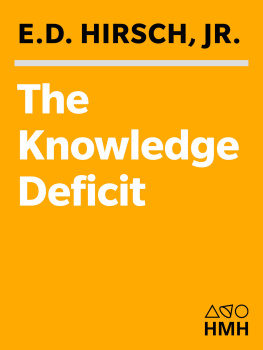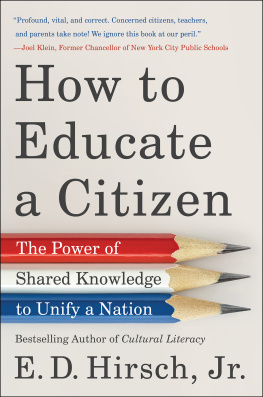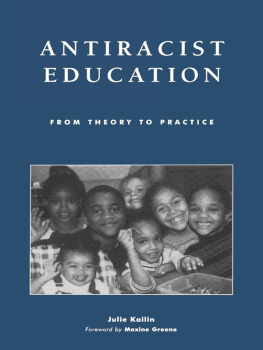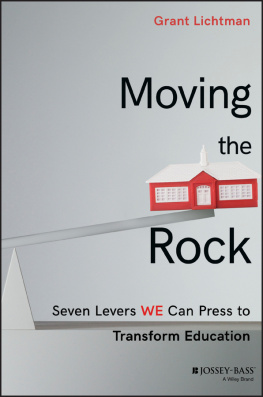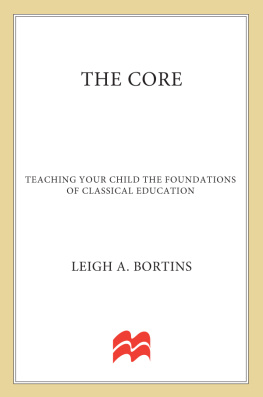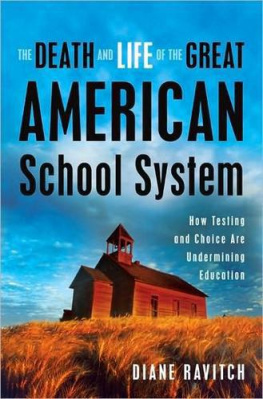Copyright 2006 by E. D. Hirsch, Jr.
All rights reserved
For information about permission to reproduce selections from this book, write to or to Permissions, Houghton Mifflin Harcourt Publishing Company, 3 Park Avenue, 19th Floor, New York, New York 10016.
hmhco.com
Library of Congress Cataloging-in-Publication Data
Hirsch, E. D. (Eric Donald).
The knowledge deficit : closing the shocking education gap
for American children / E. D. Hirsch, Jr.
p. cm.
Includes index.
ISBN -13: 978-0-618-65731-5
ISBN -10: 0-618-65731-2
1. Reading. 2. ReadingUnited States. 3. LiteracyUnited States.
4. EducationUnited StatesPhilosophy. I. Title.
LB 1050. H 567 2006 428.4'071 DC 22 2005023075
e ISBN 978-0-547-34696-0
v3.0518
FOR ELIZA,
who hasnt yet started school
may this book help make her time
there rich and productive
Preface
This book offers solutions to the related problems of low reading abilities in American children and the needlessly wide achievement gaps between ethnic and racial groups. As I edit the book, I see a report in the Washington Post that carries this headline: Schools Shift Approach as Adolescent Readers Fail to Improve. The gist of the article is that nine-year-olds have measurably improved in speed and accuracy at sounding out words, but thirteen-year-olds have not shown any advance in reading comprehensiona result that is forecast and explained here. Although the experts interviewed for the Post article say that we should expend more effort on these thirteen-year-oldsfor instance, enrolling them in power literacy classessuch efforts will certainly fail unless schooling is radically changed in the grades before middle school. By the same token, the renewed emphasis on high school will yield similarly disappointing results for similar reasons. Anyone who digests the following pages will come to understand that the reading problems of middle school do not lie in middle school at all, nor those of high school in high school.
To bring all children to reading proficiency and at the same time narrow the academic gap between racial and ethnic groups are goals that have eluded American schools for too long. This book explains why universal educational achievement with equity is possible but also why it cannot be accomplished overnight. We now understand in some detail why childrens acquisition of knowledge and vocabulary is necessarily slow and gradual. Yet despite this inherent gradualness, we can greatly accelerate the achievements of all students if we adopt knowledge-oriented modes of schooling that use school time effectively, and if we abandon process-oriented notions like reading comprehension strategies that waste precious school time. The only way to attain the long-desired educational goal of high achievement with fairness to all students is through a structure in which each grade, especially grades one through five, builds knowledge cumulatively (and without boring repetitions) upon the preceding grade. That structure has been lacking in the United States since the 1940s, mainly because one set of ideas has triumphed over another. The importance of ideas and the importance of knowledge are twin themes of this book.
Recently educators have deplored the unfairness of the digital divide, a phrase used to signify a gap between students who have ready access to computers and those who do not. But while we strive to overcome such unfairness in material distribution, we should not overlook the much more significant unfairness of the knowledge gap between children from different economic strata. (Nor should we overlook the other knowledge gap, here called the knowledge deficit, between the majority of American students and those who attend more coherent systems of schooling in other nations.) Universal access to computers does not by itself go very far in fostering the democratic ideal of making all students competent irrespective of their social backgrounds. If we had a choice between offering each child a computer and imparting to each the broad knowledge that enables a person to use a computer intelligently, we should unhesitatingly choose knowledge.
The book is directed to a general audience as well as to professionals in education. Both groups need to be addressed to help foster significant educational reform. Parents and citizens have the political power to insist on altering received ideas and practices, since without wide public support, no significant educational reform can occur. But in the end, it is the professionalsteachers and administratorswho will carry out the reform. For these experts I have provided generous footnotes to the relevant research. Both groups want the same resultcitizens who are well educated and competent regardless of economic, ethnic, or racial background.
One of the big ways in which we Americans distinguished ourselves from Europe when we created a nation was by adopting the egalitarian idea that great discrepancies in ones life chances should not be the result of who ones parents happen to be. The ideal of a career open to talents has been one of the most inspiriting ideals in democracies generally and in the United States especially. From the start we rejected inherited titles and aristocracy. Thomas Jefferson urged the Virginia legislature to abolish primogeniturethe principle that the advantaged oldest son automatically inherits everything. If we fail in our traditional aim of providing equal opportunity to all children at the beginning of life, we fail in our duty to preserve what is best in our inheritance, and we squander the profoundest source of our influence in the wider world. President Reagan was right to use John Winthrops image of America as a city on a hill in order to suggest that the ultimate source of our strength and safety is the power of the example that we set when we live up to our ideals.
1. Why Do We Have a Knowledge Deficit?
The Achievement Crisis
T HE PUBLIC SEES that something is badly amiss in the education of our young people. Employers now often need to rely on immigrants from Asia and Eastern Europe to do the math that our own high school graduates cannot do. We score low among developed nations in international comparisons of science, math, and reading. This news is in fact more alarming than most people realize, since our students perform relatively worse on international comparisons the longer they stay in our schools. In fourth grade, American students score ninth in reading among thirty-five countries, which is respectable. By tenth grade they score fifteenth in reading among twenty-seven countries, which is not promising at all for their (and our) economic future. In the global age, a persons and a nations economic success depend on high reading and/or math ability. We have learned from the phenomenon of outsourcing that those who have these abilities can find a place in the global economy no matter where they happen to live, while those who lack them can be marginalized even if they live in the middle of the United States.
That this crisis in American competence should have been a topic during a recent presidential campaign, even in the midst of terror threats, is a striking sign of its present importance to the American peopleof our growing sense that we, like other peoples these days, must live by our wits. The reason that reading ability is the heart of the matter is that reading ability correlates with learning and communication ability. Reading proficiency isnt in and of itself the magic key to competence. Its what reading enables us to learn and to do that is critical. In the information age, the key to economic and political achievement is the ability to gain new knowledge rapidly through reading and listening.

